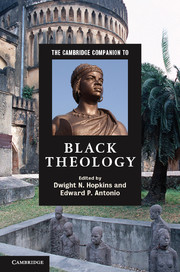Book contents
- Frontmatter
- Part I Introduction
- Part II Themes in black theology
- 6 God
- 7 Jesus in black theology: the ancient ancestor visits
- 8 Black theology and the Holy Spirit
- 9 Black theology and human purpose
- 10 Theology's great sin: silence in the face of white supremacy
- 11 Theodicy: “De Lawd knowed how it was.” Black theology and black suffering
- 12 Black theology and the Bible
- 13 Protestant ecclesiology
- 14 Roman Catholic ecclesiology
- 15 Dignity and destiny: black reflections on eschatology
- Part III Global expressions of black theology
- Further reading
- Index
- Other titles in the series
12 - Black theology and the Bible
from Part II - Themes in black theology
Published online by Cambridge University Press: 28 September 2012
- Frontmatter
- Part I Introduction
- Part II Themes in black theology
- 6 God
- 7 Jesus in black theology: the ancient ancestor visits
- 8 Black theology and the Holy Spirit
- 9 Black theology and human purpose
- 10 Theology's great sin: silence in the face of white supremacy
- 11 Theodicy: “De Lawd knowed how it was.” Black theology and black suffering
- 12 Black theology and the Bible
- 13 Protestant ecclesiology
- 14 Roman Catholic ecclesiology
- 15 Dignity and destiny: black reflections on eschatology
- Part III Global expressions of black theology
- Further reading
- Index
- Other titles in the series
Summary
BLACK THEOLOGY's DOCTRINE OF SCRIPTURE
Black theology views the biblical witness as one of its sources. By this it means that the Bible provides access to the divine revelation; but black theology does not equate the Bible with full divine self-disclosure. Rather it focuses on those themes within the biblical corpus that promote liberation and affirm the personhood of individuals of African descent. Thus, any notion of plenary verbal inspiration in connection with this theological perspective is misguided. In other words, black theology has never claimed to accept the entirety of scripture with its periodically contradictory statements, perspectives, and practices. This allows black theology to avoid some of the thornier issues raised by biblical scholars (and others) regarding the particulars of passages as well as entire books within the canon (e.g., the endorsement of slavery in Eph. 6; Col. 3; and 1 Pet. 2).
Following Karl Barth and the so-called neoorthodox position, black theology has adopted in large measure the perspective that the Bible is a powerful and important witness to the divine revelation, but that full divine self-disclosure has only occurred in the incarnation of Jesus Christ. Thus, black theology appropriates the biblical corpus in a selective, if not entirely critical, manner.
Using Jesus' sermon in Luke 4:18–19 as its normative hermeneutical lens, black theology advances a reading of scripture that places it in conversation with the contemporary experience of blackness among persons of African descent. Of course, it is true that the exodus narrative has functioned centrally in the black theological enterprise. Drawing primarily on the experience of slaves, the exodus narrative forms the symbolic core of much of black theology’s eschatological vision. Still, Jesus’ sermon in Luke 4 carries functional, if not logical, priority over the exodus narrative when it comes to evaluating, for example, other biblical passages.
- Type
- Chapter
- Information
- The Cambridge Companion to Black Theology , pp. 169 - 183Publisher: Cambridge University PressPrint publication year: 2012



